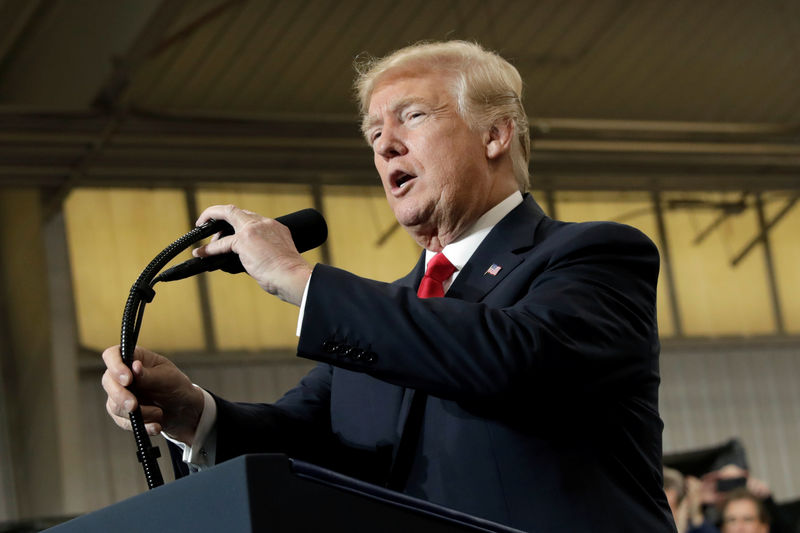By Steve Holland
RICHFIELD, Ohio (Reuters) - U.S. President Donald Trump said on Thursday he may hold up a trade agreement reached this week with South Korea until after a deal is reached with North Korea on denuclearization.
"I may hold it up until after a deal is made with North Korea," Trump said in a speech. "You know why? Because it's a very strong card. And I want to make sure everyone is treated fairly," he added.
Senior U.S. officials have expressed concerns privately that Seoul is the weak link in the U.S.-Japan-South Korean alliance and could be too quick to seal a deal with North Korea.
Trump agreed this month to accept an invitation to meet with North Korean leader Kim Jong Un. South Korean officials have said the meeting would take place by the end of May, after a North-South summit in April."We're moving along very nicely with North Korea. We'll see what happens. Certainly the rhetoric has calmed down just a little bit," Trump told construction workers in Ohio.
The United States and South Korea earlier this week agreed to revise their six-year-old free trade agreement with a side deal to deter competitive currency devaluation by Seoul and more access for U.S. automakers and drug makers to the South Korean market.The deal also lifts the threat of a 25 percent U.S. tariff on imports of steel from South Korea in exchange for quotas that will effectively cut U.S. imports of Korean steel by about 30 percent. Without the agreement in place, the tariffs would take effect May 1.
A statement by U.S. Trade Minister Robert Lighthizer and South Korean Trade Minister Hyun Chong Kim described steel terms as being agreed, with the KORUS free-trade deal changes as an "agreement in principle on the general terms" while details are still being finalized.
The U.S. Treasury and the South Korean Ministry of Strategy and Finance are finalizing the currency terms, they said.
The trade deal changes, which preserve the U.S.-South Korean trading relationship at a critical time for Seoul, do not need congressional approval but are subject to a 60-day consultation period with Seoul.
The White House said the two sides had reached a "great new KORUS agreement in principle" and it was up to Trump to decide when to finalize it.
"The president, taking into account all relevant considerations - including negotiations with North Korea - will determine the best time to sign a finalized agreement on behalf of the United States," Principal Deputy Press Secretary Raj Shah said.
South Korea's Minister of Trade, Industry and Energy Paik Un-kyu said on the sidelines of a news conference in Seoul that the ministry was trying to figure out the real intent of Trump’s remarks, a trade ministry spokeswoman said.
The ministry had made a request to the U.S. side, said a senior ministry official who declined to identified due to the sensitivity of the matter.
"In terms of the negotiation schedule, we would have to review terms legally and finalize a draft ... Both South Korea and the United States have their own domestic procedures, so we're not at a signing stage because those procedures take time," the official said.
(This story has been refiled to fix typographical error in paragraph 13)
